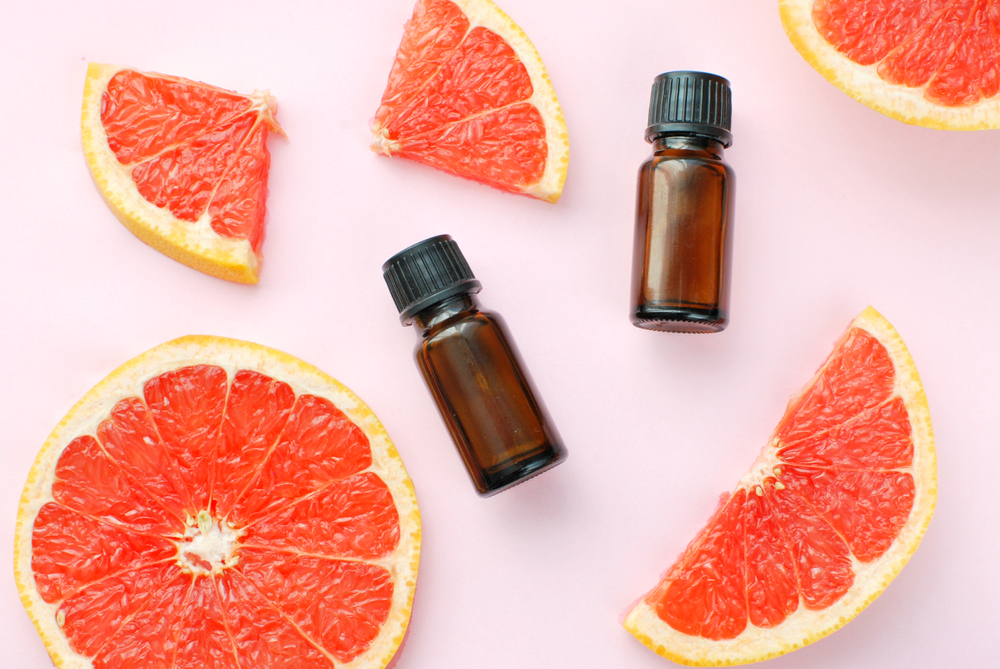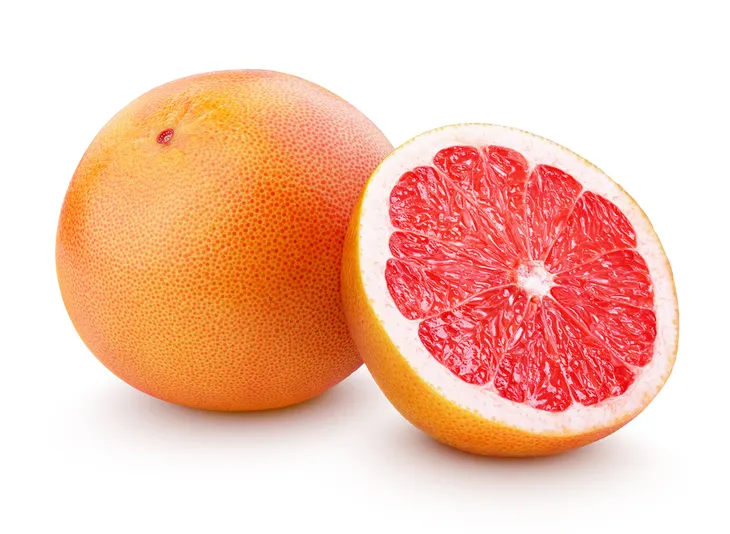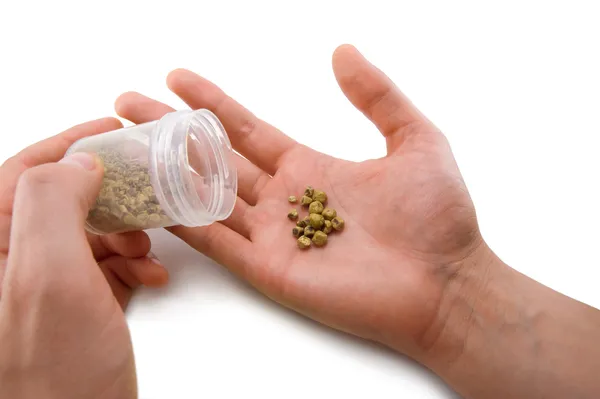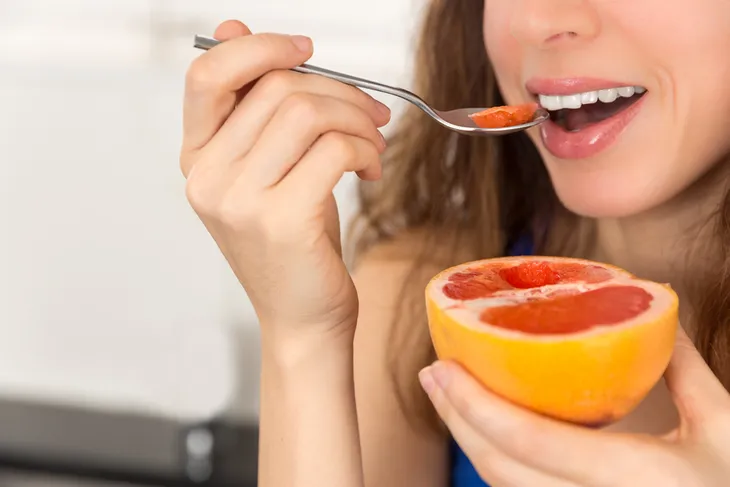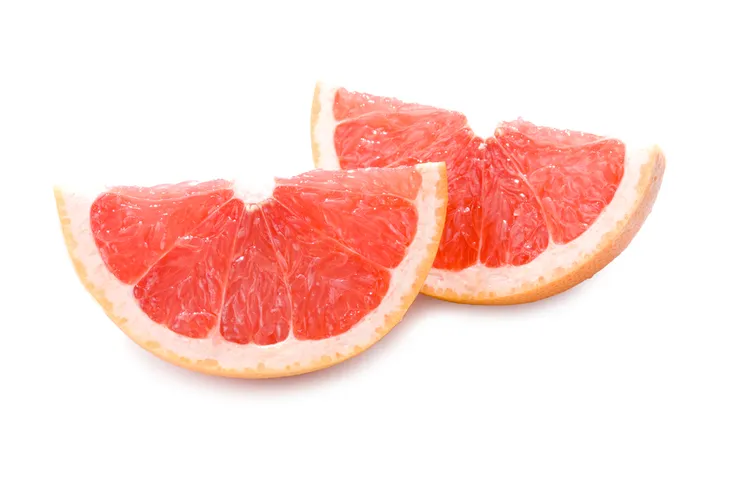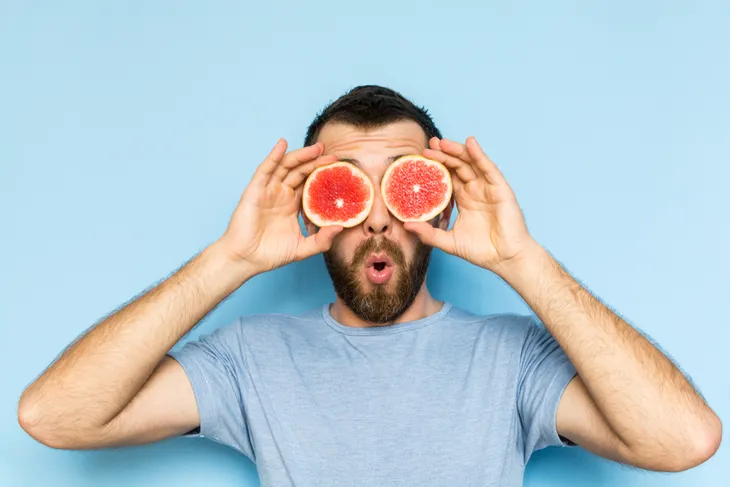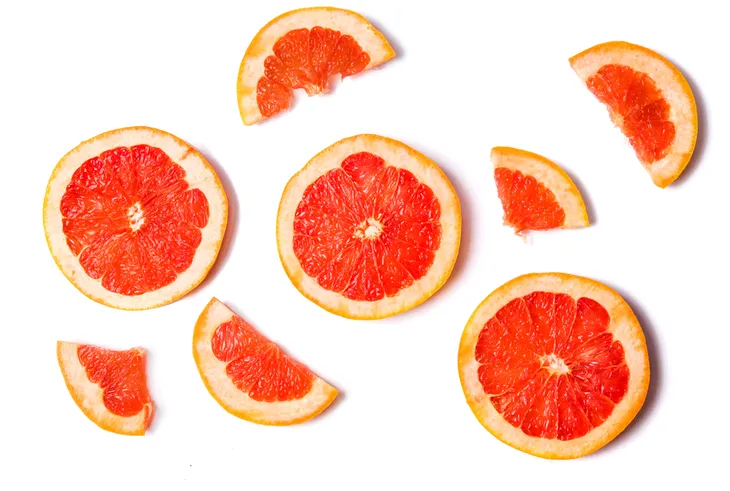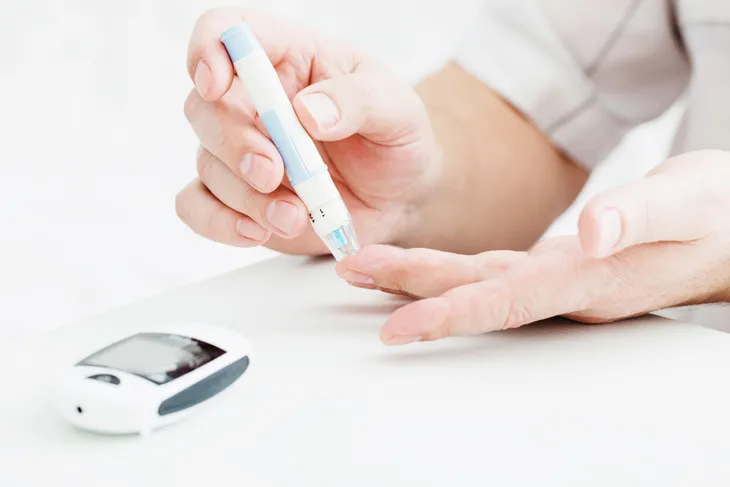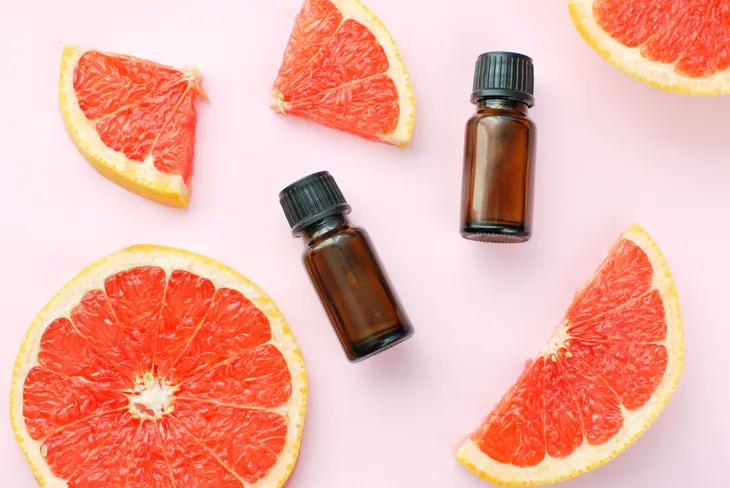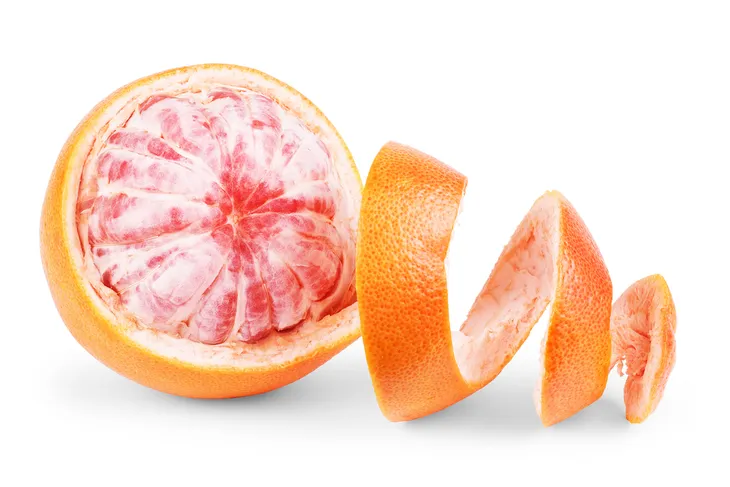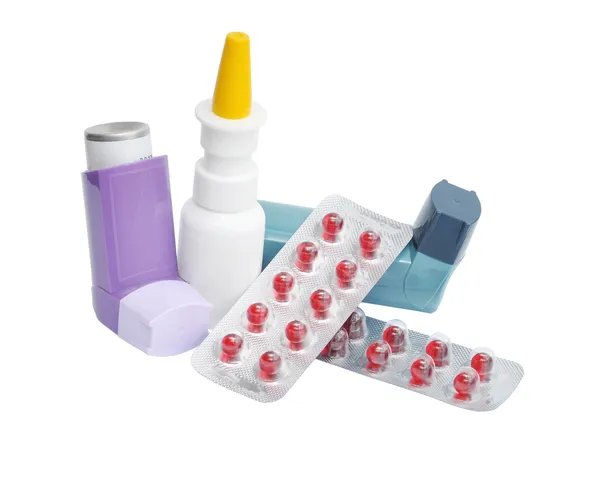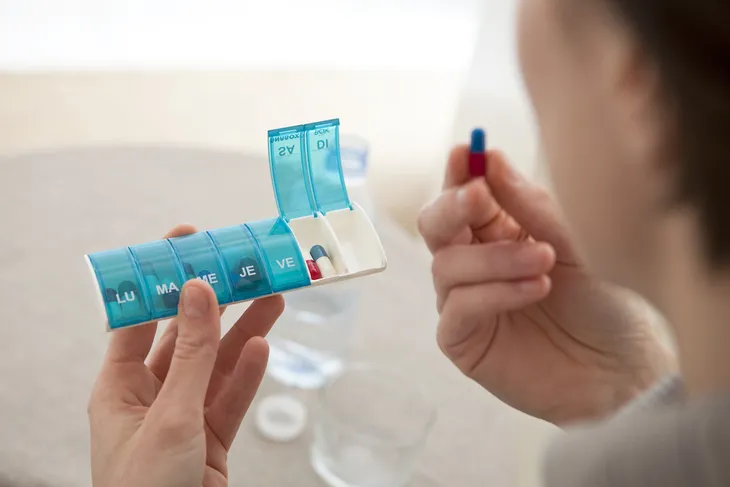This tangy fruit has a seriously bold taste which makes it a bit of an acquired taste, but it’s worth a try because it’s got some incredible health benefits! With lots of different colors to choose from including yellow, pink, and red, this nutritious and delicious fruit can be enjoyed either as a drink, fresh, or even used as aromatherapy!
We did a little research and compiled a list of all the benefits of eating grapefruit, as well as a few risks. Check it out:
Packed with Antioxidants
Apparently the color of a grapefruit matters! If a boost in antioxidants is what you’re looking for, be sure to pick the red or pink grapefruits. “They have a higher antioxidant level, specifically beta carotene,” says Wesley Delbridge, R.D. when talking to Health.com. “They also have lycopene, another antioxidant.” The same source states that lycopene can help reduce the risk of heart disease and some cancers.
Healthline gives a great overview of all the antioxidants present in grapefruits and what they do. We’ll start with vitamin A which may protect cells from damage that could lead to heart disease and cancer. Next up, beta-carotene is converted into vitamin to reduce the risk of some chronic conditions, “including heart disease, cancer and eye-related disorders like macular degeneration,” says Healthline.
There’s also lycopene which prevents certain types of cancer by potentially slowing the growth of tumors and decreases the side effects of treatment. Lastly, grapefruits are loaded with flavaones. “Their anti-inflammatory properties have been shown to reduce blood pressure and cholesterol levels, reducing the risk of heart disease.”
Reduce Risk of Kidney Stones
Anyone who’s experienced kidney stones knows that they can be extremely painful and uncomfortable. These stones develop when there’s a build up of waste in the kidneys. “These waste materials are products of metabolism that are normally filtered through the kidneys and removed from the body in urine,” writes Healthline. The waste crystalizes which is what turns it into stones that can cause blockages in the urinary system.
The citric acid in grapefruits may be effective at preventing calcium oxalate stones which are the most common type of kidney stones, “by binding with calcium in the kidneys and flushing it out of the body,” explains the source. It can also increase levels of pH in the urine which reduces the risk of kidney stones in the first place.
Hydrating Benefits
Do you find it hard to drink the daily recommended amount of water each day? Try eating more hydrating foods like grapefruit! This tasty fruit has high water content. In fact, it has more than any other fruit, including melons!
According to Health.com, grapefruits are about 92-percent water which means they’re great for our overall health. “All of our body systems and processes…require water,” says Wesley Delbridge, R.D., when talking to the source. “Proper hydration makes your body more efficient in everything you’re doing.”
Juice Up Your Immunity
It’s pretty much been ingrained in our mind that vitamin C is beneficial for the immune system. It’s why we’re told to stock up on it during cold and flu season. This is because vitamin C has antioxidant properties that can protect against harmful bacteria and viruses, says Healthline.
This source cites several different studies which have shown that vitamin C helps people recover faster from a cold. “Many other vitamins and minerals found in grapefruit are known to benefit immunity, including vitamin A, which has been shown to help protect against inflammation and several infectious diseases,” writes the source. It also contains zinc, copper, vitamin B, and iron, which all work to promote a healthier immune system.
Aids in Weight Loss
It sounds like some kind of magic trick, but studies have shown that eating grapefruits can help a person with their weight loss goals. The findings showed people who ate half a fresh grapefruit or drank grapefruit juice before each one of their meals, were able to lose more weight than those who didn’t.
Dr. Axe explains that research has found these results might be due to an enzyme called AMP – activated protein kinase (AMPK) “which appears to get activated by an organic compound in grapefruit called nootkatone.” This is the same enzyme that is activated during exercise. It encourages the “body’s energy-producing processes, like glucose uptake, for example, which helps boost metabolism,” writes the source. There have also been other animal studies (like the one published in the American Journal of Physiology-Endocrinology and Metabolism) that grapefruits could possibly prevent obesity.
May Protect Against Cancer
Sometimes the fight against cancer seems hopeless, but there are ways we can protect ourselves. One of the best ways to reduce the risk of cancer is to eat healthy and exercise regularly. Certain foods like grapefruits are high in antioxidants, some of which can actually help protect us from cancer.
Dr. Axe looks at research from the American Institute for Cancer Research which found that “grapefruit’s phytochemicals naringenin and limonin have shown an ability to reduce the growth of the colon, mouth, skin, lung, breast and stomach cancers,” writes Dr. Axe. In addition to that, studies have shown that grapefruits can promote the self-destruction of cancer cells by “[decreasing] inflammation and increase enzymes that deactivate carcinogens.” They are also high in vitamin C which prevents harmful changes to DNA.
Reduce the Risk of Stroke
According to Dr. Axe, eating grapefruit can lower a person’s risk of stroke. The source derives this information from a 2012 study by the American Heart Association which found that women are the biggest beneficiaries of lowering stroke risk by eating citrus fruits. So how does it work? Well as we’ve previously mentioned, grapefruits are loaded with flavonoids and research has shown that consuming these can reduce the risk of stroke.
The AHA looked at just almost 700,000 females and found that those who consumed high amounts of flavonoids through citrus fruits “had a 19-percent lower risk of ischemic stroke than women who consumed the least amount,” writes Dr. Axe. The source also notes that a separate earlier study found citrus fruits could reduce the risk of ischemic stroke and intracerebral hemorrhage.
Lower Cholesterol
High LDL cholesterol is not good for the heart because it’s what we often refer to as “bad” cholesterol. It’s a type of fat that can build up in the arteries and raise a person’s risk of heart attack and stroke. Definitely not good, but we’ve got good news! According to a 2006 study published in the Journal of Agricultural and Food Chemistry, eating just one grapefruit a day could lower a person’s LDL cholesterol by 15.5-percent. The study was performed on 57 people aged 39 to 72 who all suffered from high cholesterol and who’d all undergone bypass surgery. After one month the findings showed that those who ate a grapefruit a day had lower cholesterol, while those who didn’t, did not.
Health.com notes that a person who’s already on medication to lower their cholesterol should not start eating grapefruit every day because the FDA warns it can have a bad reaction with some medication.
Lower Blood Pressure
According to Health.com, about 70-million people in America suffer from high blood pressure (hypertension). So it’s always a good thing when we can find natural ways to lower blood pressure. “Grapefruit has got some data that it decreases systolic blood pressure, not by a lot — it’s usually about five points — but there’s definitely good data,” says Marie Chiasson, MD, assistant director of the Fellowship in Integrative Medicine at the University of Arizona College of Medicine in Tucson, to Health.com. It’s ability to lower blood pressure might be due to the fact that it has high potassium levels, writes the source. This potassium “neutralizes the negative effects of sodium.”
Similar to cholesterol, do not use grapefruit as a way to lower blood pressure if you’re already on blood-pressure lowering medication, especially if that medication is Nifediac or Afeditab. The FDA warns that these medications can be dangerous when combined with grapefruit.
May Help Control Blood Sugar Levels
Keeping blood sugar levels low is especially important for people who suffer from diabetes, but it’s also important for those who haven’t. This fruit has a low glycemic index (GI). Health.com says it’s only around 25 which basically means it doesn’t raise blood sugar levels as fast or much as other foods like white bread or even other fruits like a banana.
To back this claim up, Health.com refers to a 2006 study published in the Journal of Medicinal Food which found that “people who ate grapefruit (juice or half a fruit) before a meal had a lower spike in [the hormone that regulates the amount of glucose in the blood] two hours later than those taking a placebo, and fresh grapefruit was associated with less resistance,” writes Health.com. It’s important to note that the subjects of this study were all obese and not all of them had type 2 diabetes.
Every person is different, so if you’re someone who’s been diagnosed with type 2 diabetes, you should check your blood sugar levels after eating a grapefruit, just to make sure that it will be a healthy addition to your daily diet.
Good For Your Skin
Eating healthy is good for our bodies, inside and out. Grapefruit is one of those foods that not only contributes to our overall health internally, it also naturally cleanses our skin. This is why there are many grapefruit infused skincare products. What makes it so good is that it’s loaded with vitamin C “which acts as an antioxidant to protect the skin and also is essential to the formation of collagen, a major building block of our skin,” writes Dr. Axe. Ladies, forget the botox. Eat collagen-boosting foods because this is what helps prevent wrinkles.
As previously discussed, pink and red grapefruits have more benefits. Pink especially are good for the skin because they have more beta-carotene which slows down aging and improves hyper-pigmentation. It also contains lycopene, “which is known to guard against sun-induced skin damage and mutation as well as inflammation in general.” Just in case you’re still not fully convinced. It also has natural ingredients that fight against acne and cleanse our pores.
Eat the Pith
If you’re like me, you peel of that white flesh that stands between the skin of the grapefruit and the juicy inside. Don’t do this! Health.com points out that a lot of a grapefruits nutritional benefits are in this white flesh which is referred to as the pith. “That [pith] is very rich in antioxidants and nutrients and also soluble fiber which is going to help you feel fuller and impact your glucose reactions,” says Delbridge, R.D. to Health.com.
We’ll admit the pith doesn’t taste very good, but it’s worth eating because it has so many nutritional benefits.
Grapefruit is Acidic
If you’re prone to canker or cold sores you likely realize that eating any citrus fruit during an outbreak can be like bathing a wound in an acid bath. It’s excruciating so avoid it at all costs.
Dental professionals also remind us that acidic foods, like grapefruit, can lead to erosion of protective tooth enamel. To avoid expensive dental bills, rinse your mouth with water, followed by brushing and flossing, after you eat highly acidic foods.
Grapefruit and Allergy Meds
As much good as grapefruit can do for your body, doctors and pharmacists often remind us that this fruit (and juice) can negatively mix with certain medications, both prescription and over the counter. The negative interaction stems from a specific enzyme known as CYP3A4, which can heighten the breakdown of drugs in the body and cause poisoning.
Most notably grapefruit can have bad consequences when taken with certain allergy medications (i.e., Allegra, Claritin), according to pharmacists at Omaha’s University of Nebraska College of Pharmacy.
Grapefruit and Other Medications
In addition to negative interactions with certain allergy medications, grapefruit can cause havoc with other prescription medications as well. According to researchers at the University of Nebraska College of Pharmacy, in Omaha, if you take Xanax (or alprazolam) to reduce anxiety, Invirase for HIV/AIDs, fentanyl patch, or cholesterol-lowering statin drugs (like Liptor or Zocor), taking with grapefruit can cause medication to build up in your system.
Finally, the same source notes that if you take phosphodiesterase inhibitor medication for erectile dysfunction (i.e., Cialis, Levitra, or Viagra), you may be prone to painful, damaging, prolonged erections, and priapism. Grapefruit can also lead to low blood pressure, dizziness, and headaches, flushing, and low blood pressure. To avoid a potentially-dangerous drug interaction, talk to your doctor about safe alternatives or steer clear of grapefruit and grapefruit juice altogether.
